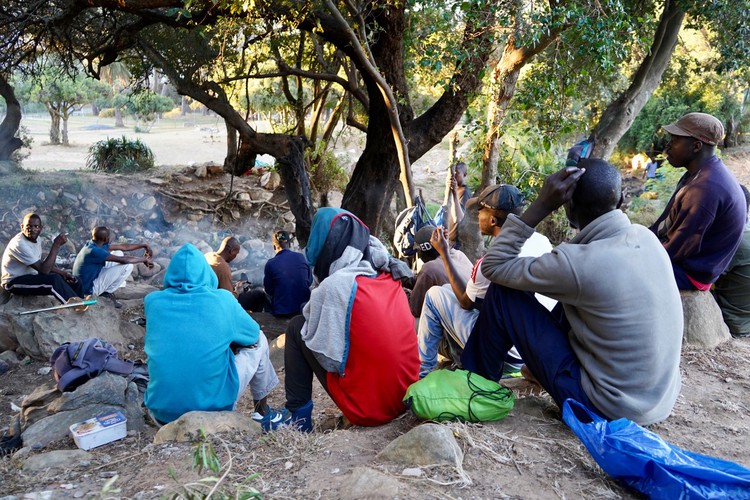
A group of homeless people in Cape Town’s Van Riebeeck Park. Photo: Tim Wege
2 April 2020
The City of Cape Town has laid 280 extra places for homeless people since the start of the lockdown, but it is far from enough, and many have been left with no choice but to defy the rules.
Last week, after President Cyril Ramaphosa announced the nationwide lockdown on Monday 23 March, Mayco Member for Community Services and Health Zahid Badroodien said that a number of sites would be set up around the City, including repurposing the abandoned Robbie Nurock Day Hospital.
But City Councillor Brandon Golding said that Robbie Nurock Day Hospital would no longer be used by the City as a site for sheltering homeless people as it is preferable as an isolation centre. “We’re trying not to use small sites as it spreads our safety resources too thin.”
As a result, only the expansion of the Culemborg Safe Place, an outdoors area for homeless people underneath a highway overpass on the Foreshore, has created new shelter for the city’s homeless people.
Culemborg initially provided shelter for 230 homeless people when it was launched in 2018. It was extended to accommodate 280 more people on 31 March 2020.
The Western Cape government estimates greater Cape Town’s homeless population at about 5,000 homeless people, of whom 700 live in the city centre. These figures exclude the estimated 500 to 900 refugees and asylum seekers who were part of the sit-in protest at the UN High Commissioner for Refugees offices last year. This group is now divided between approximately 200 people living outside the Cape Town Central police station, and 300 to 700 people living inside the Central Methodist Church.
Walter Nyamugama, a 26-year-old man originally from Zimbabwe who has been living without shelter in Vredehoek’s Van Riebeeck Park, says the City has been slow to help its homeless residents.
Since the lockdown was implemented, Nyamugama has been sleeping at the park with about 100 other homeless people, including locals and immigrants. On Tuesday morning, according to him, police vans arrived at the park and took about 40 local homeless people to the Culemborg Safe Place. He says a number of other people staying in the park ran away as the vans arrived, afraid of where they might be taken.
According to Nyamugama, since the lockdown, the group at Van Riebeeck Park have been regularly visited by SAPS officers and City law enforcement – the only state officials to communicate with the group so far. Nyamugama says that officers provide contradictory messages. The group has been told to disperse during the day, but have also been told to remain in place at the park.
There are no feeding schemes in the Vredehoek area. According to Nyamugama, they have been directed by police to two sites where they may get a meal – the Haven night shelter in Greenpoint and the Culemborg Safe Place. Both kitchens are run by the non-profit Ladles of Love. However, Nyamugama and the others staying at Van Riebeeck Park say that they are prevented from proceeding to the soup kitchens by City law enforcement officers and SAPS, and told to go back to the park. The homeless group have been threatened with 27 days in prison if they do not comply.
SAPS spokesperson Captain Ezra October denied that it was police policy to prevent homeless people from moving around the city, saying, “SAPS cannot prevent homeless people from getting to where there is food”.
He said that police did need to minimise movement of all people during the lockdown, but that SAPS would never arrest a homeless person for being homeless. He said that there was no protocol for police to move homeless people around the city. October said he hoped that national, provincial and local governments would be able to address the lack of temporary shelter soon.
Mayco Member Badroodien, in response to GroundUp’s queries, said: “It should be noted that, unlike in other metros where national government and Transnet provided numerous facilities to accommodate street people, this has not happened in Cape Town. It is for this reason that the City has gone about finding temporary shelter sites that would meet the requirements. Most of our community halls are too small to hold large enough numbers of people, taking into account the social distancing and general hygiene protocols that the situation demands. It would also mean far too many sites around the city, which would require more resources in terms of site management etc.
“The City of Cape Town notes the ongoing interest in the provision of temporary shelter for street people during the lockdown period. The Culemborg site remains operational, and work continues on the Paint City site in Bellville. The City has however drafted an amended proposal for accommodation, the feasibility of which is still being determined. We will communicate on the matter as soon as we are able to.”
The people living at Van Riebeeck Park are forced to cobble together what little money they have to buy supplies at the Gardens Centre Pick n Pay. Last night, members of the Gardens Community Action Network delivered sandwiches to the group, after hearing of their plight.
The people living in the park are aware of the dangers of Covid-19, and worried about it, but simply cannot do more than they can at present.
Nyamugama doesn’t understand why homeless people can’t be accommodated in one of the many empty buildings in Cape Town.
He says he doesn’t know whether people living in the tents will have enough warm clothing and blankets to stave off illness in winter.
According to GroundUp’s calculations, there are currently 9,000 vacant beds in hotels in the city.